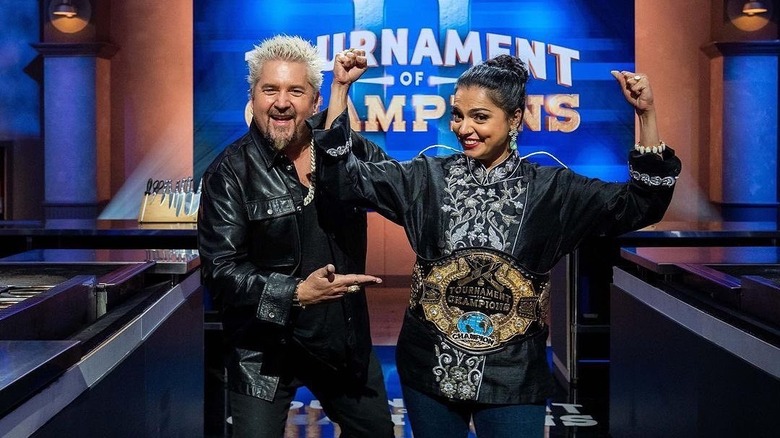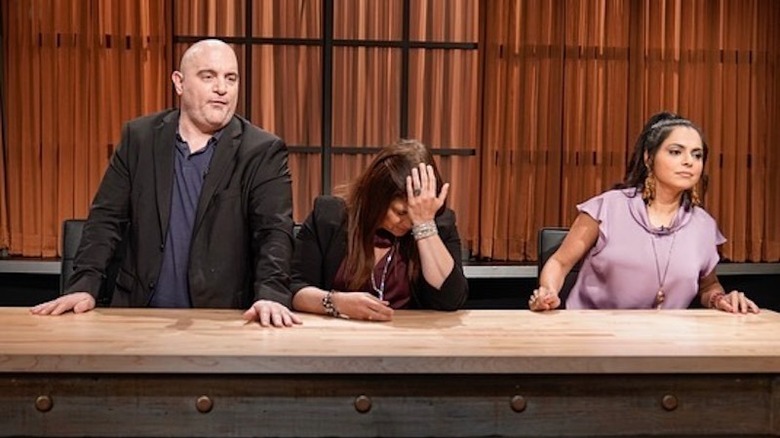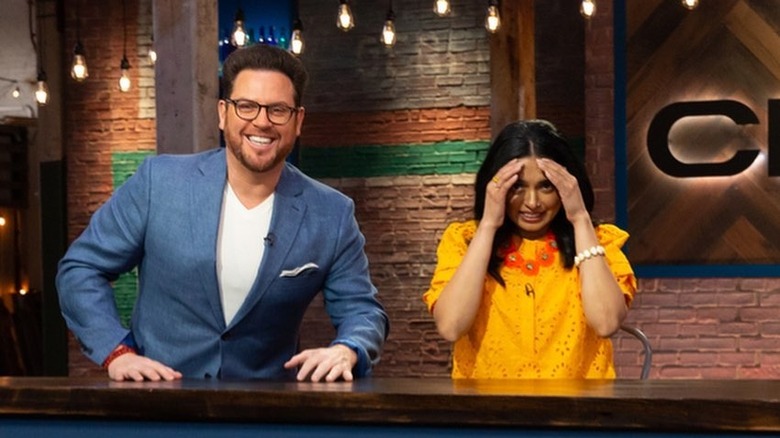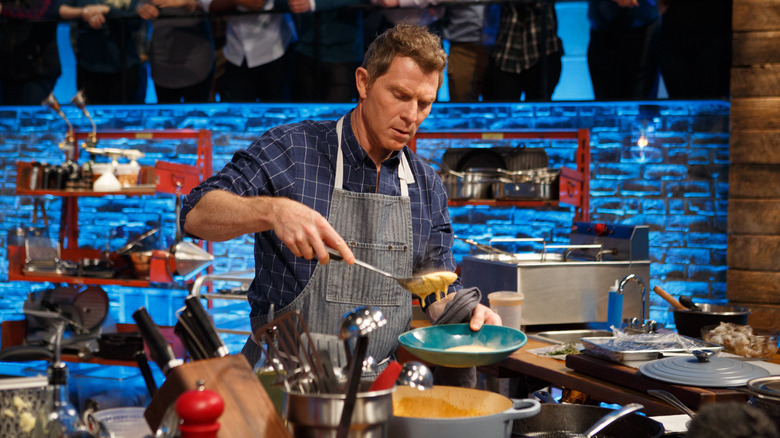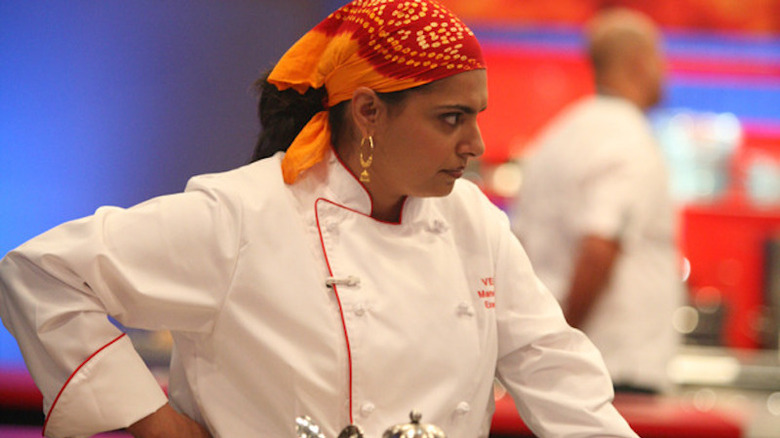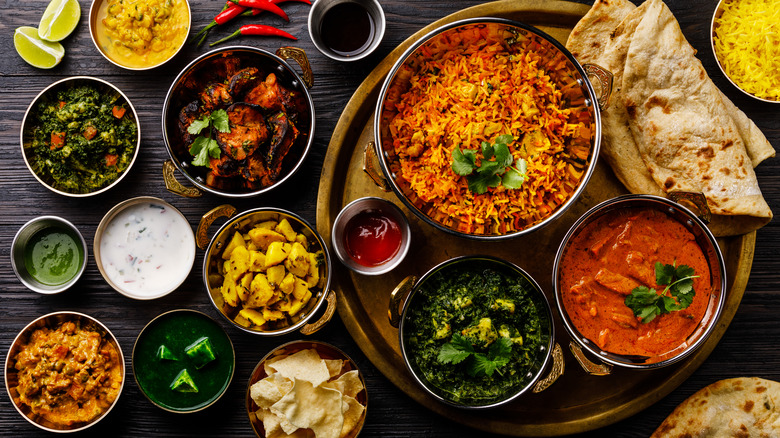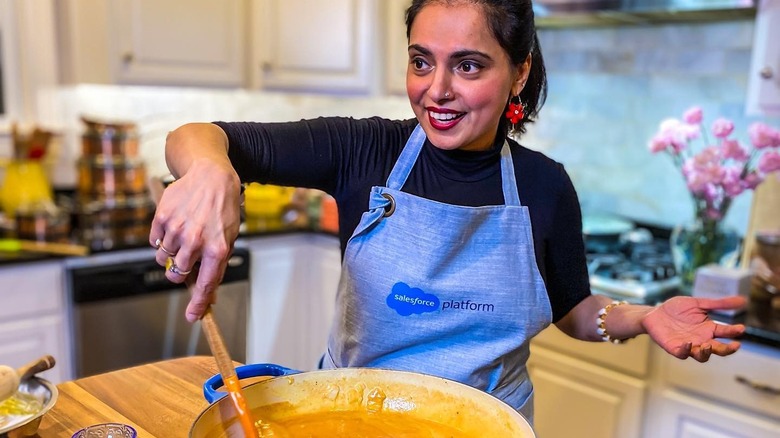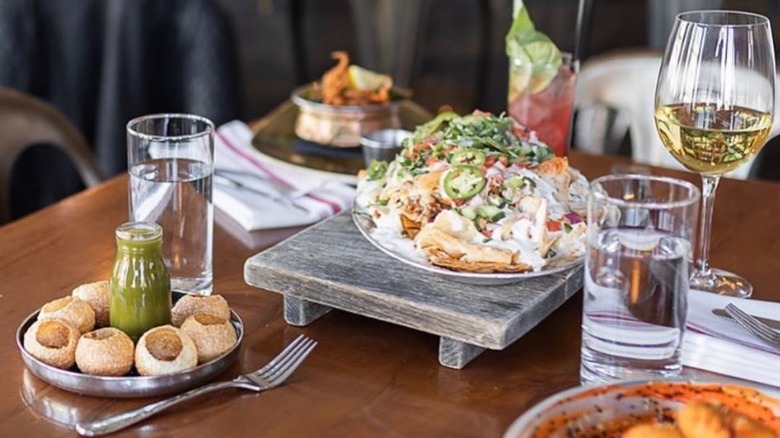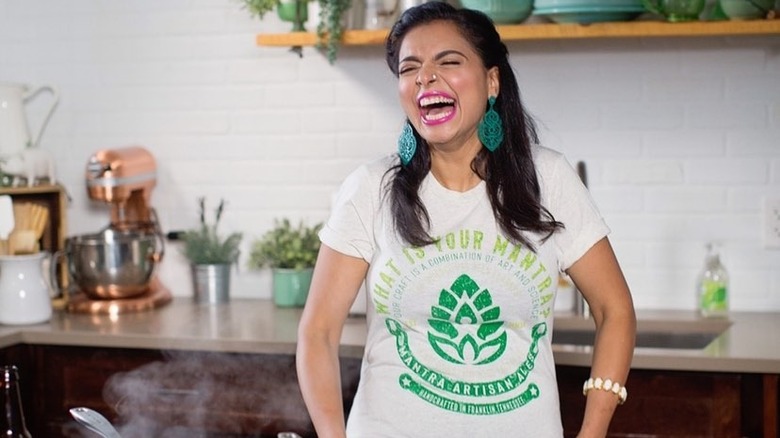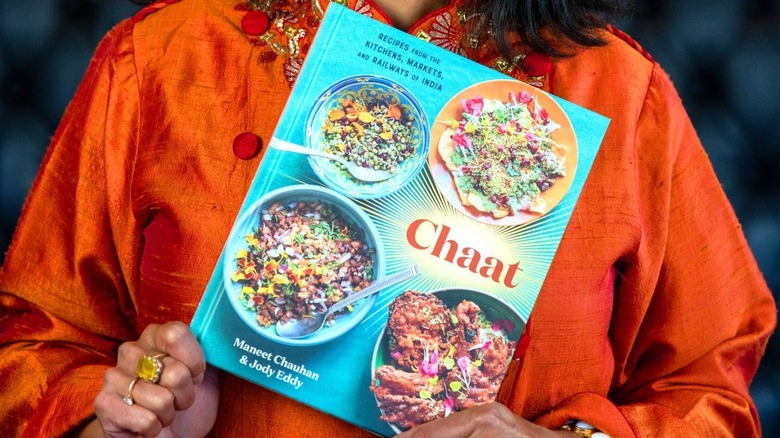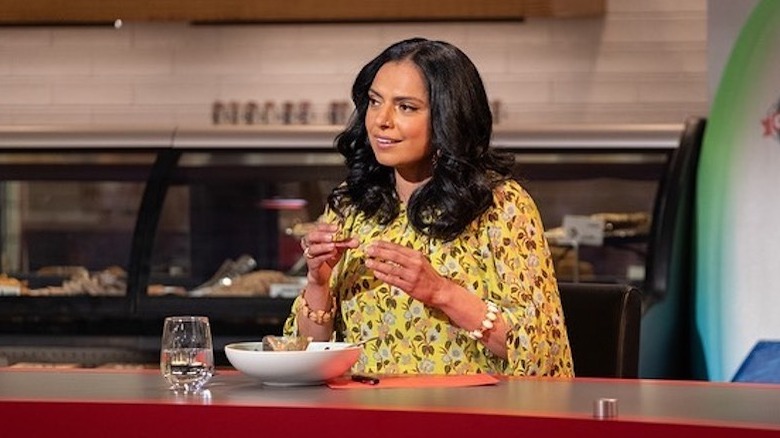Maneet Chauhan Talks Her Food Network Career And Indian Food - Exclusive Interview
We may receive a commission on purchases made from links.
If there's one thing Maneet Chauhan is not afraid to do, it's going after whatever she wants. The Indian-born chef and regular "Chopped" judge started her career in her homeland with dreams of moving on to bigger and better things. So she came to the States to attend the Culinary Institute of America. After rising to the top of her class, she set her sights on "Iron Chef." A few years later, she found herself the first and only Indian female competing in the "Iron Chef" kitchen, against the legendary Masaharu Morimoto no less.
Today Chauhan is fresh off her "Tournament of Champions" win, and making a splash across a range of Food Network shows, including a brand new sweets competition, coming out just in time for Halloween. That's on top of a handful of restaurants and cookbooks, not to mention a brewery, all under her belt.
Mashed got the chance to talk with Chauhan all about her wide-ranging food and TV career in an exclusive interview, and she revealed inside details from the sets of some of the most popular Food Network shows. Chauhan also shared some of her innate knowledge of Indian food and tips for home cooks who want to spice things up.
Maneet Chauhan on winning Food Network's Tournament of Champions
Earlier this year you won what has been called one of the toughest culinary competitions on Food Network. What was it like to compete in the "Tournament of Champions"?
"Tournament of Champions" is probably one of the most intense competitions out there. I mean, I have done it all. I've done "Iron Chef", "Chopped", "Next Iron Chef." If you asked me about a competition out there, I've done it. But with "Tournament of Champions"... the crazy part is the "randomizer." Because I think that with the rest of the competitions, there is a method to the madness, right? "Tournament of Champions", there is no method to the madness. This is not one of those tests that you cram overnight and you'll pass the next day. It's not going to happen. You have to be very consistent about your career and your craft for your entire life. And that is the culmination of your entire career. What you've learned your entire life, what you have concentrated on. That's the time to shine. So it's crazy. I mean, I'm already stressed out about next year's, because I'll have to defend my belt. So it's going to be fun.
The last time you competed you were eliminated in the semifinals. So what did you do differently for Season 2?
I think the most important part is to understand what the competition is, and give your best. I think that's it, right? At times, we as chefs, I think we tend to over-complicate things, where you're like, "Oh, I have five minutes left. Maybe I can add another ingredient, or another component." And then it all falls down. So I think to me, the strategy was to understand what the different components are to keep it flavorful. Because to me what my forte is, just putting across just absolutely incredible flavors, even if I say so. And I think that's what I did. I played to my strengths ... at times when you're in a competition you gauge who your competitor is, and then you play to their weaknesses, as opposed to your strengths. And that's not a smart gameplay at all.
These are long days of filming that get crammed into just an hour-long episode. Did anything happen that viewers didn't get to see on camera?
I think that one of the most amazing things about [being] behind-the-scenes of "Tournament of Champions" is ... there are 16 of us competing against each other, but the amount of comradery that we have among the 16 of us, the amount of smack-talking which is going on.
I remember the first episode where all of us are walking on, and Brooke [Williamson] has her belt on and I look at her, I'm like, "That's going to be mine." And I'm like, at that time it was just this show of bravado that, okay, I'm not afraid, though of course, I'm so scared inside. But it's family. And everybody now also keeps on pulling my leg. They're like, "Maneet, we're coming after you." I'm like, "You can try." So that comradery, the fact that you keep on pulling each other's leg, I think that is something that viewers would really love to see.
Maneet Chauhan describes a typical day on the set of Chopped
Speaking of family, you are most famously known on Food Network as a long-time judge on "Chopped." Describe what a day on set filming is like.
Oh my God. So my day starts around 5:30-6:00 a.m. That's the time that I get to the set, only because I require the most amount of hair and makeup, which I love, no questions about it because the transformation is fantastic. So we start filming by 8:00, and that is something which everybody [knows], it's down to a science. We've been doing it for 12 years now. And it's really interesting because each and every round is timed. It is 20 minutes. It's 30 minutes. It's 30 minutes. There is no grace time which has [been] given because that's how you get the drama around it. What takes time is in between. Like getting the dishes in front of us, or clearing the dishes, or repositioning the cameras, et cetera. And then there's a lunch break, et cetera. We are done filming by around 5:00 ish or so. So it's a fairly decent day.
And I can't tell you how much I love being on the set, because there is so much laughter ... And now especially where all of us have moved away from New York, or are in different places, when we reconnect it is just catching up. Our families are growing, our businesses are growing. Catching up and just laughing. That is something which I always walk away from the set feeling very happy. It's like meeting a completely dysfunctional family, like our family for Thanksgiving. And that's what it is.
When the contestants are standing in front of you to get their plates judged, the whole kitchen behind them is spotless. Is it fair to assume that cleanup happens sometime between the final buzzer and the judging? Does that mean that you guys are tasting and judging cold plates of food?
So what the creators and the producers encourage us to do is, as soon as the time is up, all the chefs, they head over to what is called a sequester room. At that time, all of us judges, we walk through their stations and taste all the different components while they are hot. Temperature is definitely something that we've been told not to take into consideration when we are judging.
If there is something which is temperature-sensitive, like ice cream, that is immediately thrown in the freezer, so that the integrity of the temperature is kept. But other than that, we make it a point that we go about, taste all the components, know how it tastes when it's supposed to be served, the temperature that it is. And then yes, usually the food that we get is at room temperature.
Maneet Chauhan reveals the most memorable dishes she's tasted on Chopped
You've probably tasted hundreds of dishes on "Chopped" at this point. What are some of the best and worst things you've ever eaten on that show?
Recently there was this really incredible chef who made a Middle Eastern dessert called malabi, which is an orange blossom, cornstarch, almost like a pudding, but it's a set pudding. But what I loved was that she set it. Usually, pudding in a 30 minute round is a bad idea, but because it was using cornstarch the gameplay was so smart. But also the fact is that she cut them into really thin strips. And then, I think, poured a really floral syrup on it, like a water, almost like a matcha water, and served it to us like a dessert Udon noodles, which blew my mind, not only in terms of flavor, but also in terms of the presentation of it and the creativity around it. So that was amazing. I remember somebody had made a risotto with root vegetables, which was fantastic. So we do get, I mean more often than not, we do get some really, really good dishes.
And then there are some times where we really don't get great dishes. I think a lot of that time also comes down to the ingredients that are in the basket, as at times the really tough ingredients would stump everybody. One of my least favorite ingredients on "Chopped" has been balut. Balut is a delicacy in Southeast Asia. It is fertilized aged duck eggs. So when you break it you actually see the embryo in it. And that completely puts you off. That was something which, even though the chefs were very creative, in my mind I just couldn't get around that.
You've been on both sides of this competition. You've judged "Chopped," you've competed on "Chopped All-Stars." Do you have the answer of what it takes to win?
I don't think that I have the precise answer, what it takes to win, because I have won some, I have lost some. But I think the biggest thing, which I try to follow is to be true to your flavors. I think what has gotten me the win is the flavors that I work with, and the spices, or even the techniques. It was interesting. Scott [Conant] and I, we had a conversation once where I was saying that because my forte has always been Indian food I think I've always thought that I've been at a disadvantage. Till the time he turned, he's like, "Are you kidding me? The way you work with spices is something that none of us can do. And that is your biggest strength." And that was, I think I needed that pep-talk because I'm like, "You're right. Yeah. Okay. Yes." So I use it to my best advantage.
Maneet Chauhan on what Bobby Flay is really like and what it takes to outcook him
You have also been a judge several times on "Beat Bobby Flay". We're big fans of that show as well at Mashed. What is it like to be on that show? What's Bobby Flay like in person?
Oh my God. Chef Bobby Flay. He's absolutely one of the most gracious people that you can come across. I mean, a gentleman. I mean, it's amazing. But what I really, really love about him is the fact that when he does these throwdowns, there is a lot of homework which has gone into it. Because this is his entire life's work. If somebody tells him that we are going to make chicken tikka masala. He knows it. He's done his research on it for him to do it, but then he's not shy about putting his own flair to it, because that is definitely what makes him who he is. He's also very encouraging to the person who he has a throwdown with. And it's fun. We do see the banter, but he is ... the respect that he has for the other person who is cooking with him, or against him, is something which shines through. So it's really, it's amazing.
We've seen it be done before. What does it take to actually beat him?
I think flavors ... I keep on rounding back to flavors. Your techniques might be perfect, but if there's no follow-through with the flavors, then you're not going to win. And that is what Bobby Flay is known for. He's known for his amazing flavors, the way he uses chilies, the way he uses fresh herbs, the way he plays around with these ingredients and serves you a dish, which literally is like, you take a bite and you're like, "Wow, what just happened?" So I think that is what it takes to beat Bobby Flay.
Maneet Chauhan on competing on Iron Chef
Another intense competition kitchen that you've competed in is "Iron Chef", and you competed on "The Next Iron Chef." You are also the only Indian female to compete on "Iron Chef". What was that experience like?
It was surreal, because, I came from India to go to the Culinary Institute of America over here. This was in probably in '98, '99 ... And that's the time when "Iron Chef" was going crazy. So to me, it's really interesting, because when I was in India I used to see this show called "The Cooking Secrets of the CIA." And I'm like, one day I'll go there. And I reached there. And then when I was at the CIA, I would look at the Iron Chefs and I'm like, "One day I'll compete against them." And I did it. So to me, it was a very humbling moment, because I'm like, "I dreamt this, I wanted this, and I achieved it."
And then, also, going up against the OG Chef [Masaharu] Morimoto. Chef Morimoto literally started his career the year I was born. And it was just so intimidating to be against him where he is. Literally, he defines what an OG is. So it was amazing. It was fantastic. I was really humbled to have that experience, especially going up against him. I screamed from the rooftops that I came a respectable second among two people. It sounds better than saying that I lost. But it definitely, I think, was the one thing which opened doors for me at least for Food Network, because seeing me compete over there I was invited to be on "The Next Iron Chef", where again, I was trying to figure out my sea legs. And I think from there, the producers on "Chopped" saw me, and invited me to be a guest judge, I think, for the second season, or so. And then the next season they invited me to be a permanent judge. So that was the evolution of how I got on Food Network.
Do you think you'd ever compete on "Iron Chef" again?
Why not? I mean, I've got nothing to lose. I mean, other than a competition. But I think competing and judging, it makes you a stronger chef, because the amount of things that I have learned from competing and judging, not only about myself, but about different ingredients, has made me really a much stronger chef.
Maneet Chauhan shares what you need to know about Indian Food
You've established yourself as a go-to figure when it comes to Indian cuisine, and Indian spices. What are some of the biggest misconceptions about Indian cuisine that are out there that you want to set the record straight on?
Oh, my God. How much time do we have? To me, the biggest eye-opening experience was when I moved over here and I went to the CIA. I was the only Indian student on campus for the majority of my part over there. And people are like, "Oh, let's go and have some Indian food." And my first exposure to Indian food was an $8.95 all-you-can-eat buffet. And I'm like, "This is not what we've grown up with," because what we've grown up with is farmer's markets. Those were the only markets that we had that we could go to. It was all about seasonal cooking. It's all about fresh food. And these curries are something which are, if cooked properly, with the right amount of spices and not too much oil to kill all the ingredients. It's just such a beautiful cuisine. So I think that's the first thing that I would say.
And the second is, there is nothing known as curry powder in Indian cooking. It is a blend of different spices, and everybody has their own unique blend. I mean, I love the fact that there is curry powder on the shelves to make Indian food more accessible, but usually, most of these blends do not do justice to what Indian spice blends are. And, of course, the most important thing. Spices are the foundation of Indian food, but they'll be your friends if you treat them properly. So you have to let the spices dance and sing in the oil to let them release their true potential.
Maneet Chauhan's tips for making Indian food at home
For home chefs who want to add Indian food to their wheelhouse, what are some dishes they should start with?
You know, recently this was the one thing which, during COVID, staying at home, I did a lot of was, I started doing a lot of these IGTVs and reels to show how easy Indian food actually is. And to me, I would say that the easiest thing to start off with is maybe an Indian masala omelet, or scrambled eggs, or Bhurji. And you can get flatbreads and just make these tacos, or burritos out of it, which are amazing, because it shows a little bit of both. Actually recently on Food Network, if anybody goes on their website and they do a search on chicken tikka masala, I show how to make the simplest way of making chicken tikka masala, or butter chicken, using marinara sauce.
I think Indian food needs to be a lot more accessible to people. So I show different hacks on how to still have the flavor, but you can make it yourself rather than going down a recipe list, which has like 670 ingredients, and after the fourth you're like, I'm done. So I'm like, no, not at all. You've got to make it accessible. And that's what I try to do all the time.
So Curry powder aside, what are the go-to spices and ingredients that we should have in our kitchen if we want to start cooking Indian food at home?
So, each and every Indian kitchen has this masala dabba or a spice box, which depends on which region of India you are from. They are different spice blends. I grew up predominantly in a Northern household, but I also went to school in Southern India. So mine is a combination. So I usually have turmeric. Then they are the three Cs, which is chili powder, coriander powder, and cumin powder. I usually have whole cumin seeds, garam masala, which is a blend of different spices. And each and every household has its own characteristic blend, but there are amazing garam masalas out on the market, too.
And then one of my favorite spices is chaat masala. Chaat, translated from Hindi means to lick. It's also the name of my book, which just came out. And the predominant spice in this is dried raw mango powder. So it has that dark taste to it, which is in my mind, the ultimate finishing salt to anything. Even at the restaurant, when we make a poutine with chicken tikka masala on it, when we take the fries out of the fryer, we finish it with chaat masala, and you can just eat it that way. It's so good.
Maneet Chauhan on her Nashville restaurant and making Indian food in the South
Let's talk about your first restaurant, the Chauhan Ale & Masala House. What was the inspiration? It's got a very unique menu.
So it's really interesting. When we were in New York, Vivek, my husband and I, we're business partners, and ... he had a couple of restaurants over there. I was working for a couple of restaurants over there. And then we get this opportunity, this random call that, "Hey, would you like to open something in Nashville?" And both of us turned to each other and we're like, "Who the beep goes to Nashville?" Because we had never visited. We didn't know what it entailed, but we are also the kind of people who explore each and every opportunity that comes our way.
So when we came to Nashville, we just fell in love with, not only the city and the people, the quintessential Southern hospitality, but what we fell in love was the opportunity that the city afforded us. Because Nashville as a city — this was almost around eight years ago — Nashville as a city was booming. I mean, there were all of these people from all over the world settling over here. So it had a very cosmopolitan environment, but there weren't enough restaurants which were catering to that. So we were like, "Okay, let's do this."
So to us, one of our biggest missions has always been to make Indian food a lot more approachable. And that can be done in really fun ways. So we opened the alehouse so people, even if they want to come in for a beer and then just try, maybe, the poutine, which is familiar with them, or we make these keema nachos, which again, people go crazy about. But these are approachable things that people can order at the bar and then get hooked on these flavors. And then they come back for dinner, et cetera. So that was the idea behind it. We do have a traditional aspect of the entire menu. You want your chicken tikka masala, you want your vegetable korma, you want your lamb vindaloo, we have all of that, definitely, but then there is so much more for you to discover. And it gives us a great opportunity to play along with our creative sides, too.
Do you think that Southern food and Indian cuisine interact well together?
Absolutely. There is so much commonality. I do say that Southern food is what it is because the soul in the food. And I think it's the same with Indian food, too. I mean, if you think about it, there's so much commonality. And we do that [at the restaurant]. We call it Chauhan's Ode to Nashville. So we have hot chicken pakoras, because hot chicken is a religion over here, or the entire concept of meat and three. We do, before the pandemic, we used to do the tiffins. You know, you stack up those tiffins and that's how we would serve our meat and three. Now we serve it in this gorgeous karahi dish, because that's what it is. It's a meat dish with three sides. Well, we are Indian, so the three sides ends up being seven or eight, but that's a different story. But the idea is, the essence is the same. But even in terms of ingredients, like black-eyed peas, or collard greens, things that we are familiar with. So it's very easy to play off both these cuisines and come up with delicious dishes.
Maneet Chauhan talks Mantra Ales and pairing drinks with Indian food
It was fascinating to learn that you also launched a craft brewery, Mantra Ales. How did that come about?
Well, when we were opening Chauhan Ale & Masala House, Vivek and I, we were discussing the beverage program. And with Indian food the beverage program is always a struggle because people keep on thinking like, "Oh, wines, Indian food, let's go ahead and pair it with something really sweet," because they think that the sweetness kind of balances off the spice. But beverage pairing is about enhancing the flavor as opposed to drowning it. So when we were in India beer is what we would be drinking. And it worked so beautifully with food. So our first plan was to make an entire cocktail menu based on beer cocktails, like Micheladas, and Shandys, et cetera. So while this conversation continued, we were having maybe one, or two, or three, or maybe more glasses of beer while we were discussing this, where you get the most inspiration. And we're like, yeah, best plans.
And we're like, how about just brewing these beers with spices? And that's how Mantra came about. So we started off by contract brewing with an incredible brewmaster over here, Derrick Morse. And then he came across somebody who was selling a brewery and he approached Vivek, and he's like, "Hey, do you know anybody who would want to partner?" And Vivek is like, "Hello." That's how it started. And now that small brewery has now evolved into a brew park on 83 acres of land in Murfreesboro. We are not only doing craft beers, but we are also doing the crushable cans, the everyday drinking beer under Steel Barrel or Humulus Project, which is an IPA based. We do contract brewing for hard seltzers. And it's a gorgeous property.
What are the most important things to keep in mind when trying to pair a drink with Indian food?
I think one of the most important things is to make sure that you, first, understand what is the flavor profile that you're working with. There are these what I call arcane rules of pairing wines with food, which is like, reds go with red meats, and white goes with fish, et cetera. I go ahead and pair a beautiful Malbec with a cioppino. We do a cioppino, but because I put garam masala and spices in the cioppino ... those spices, they can stand up to a Malbec. So to me, I think beverage pairing starts from understanding what food you are trying to pair the beverage with. And then I think a lot of it also needs to come down to your personal preference. If somebody is telling you that, "oh, no, you've got to have the incredible Merlot along with this," and you taste it and you really don't care for it, go with your instincts. They literally, the biggest rule is, what is right for you?
Maneet Chauhan shares the inspiration behind her newest cookbook
Let's talk about your second cookbook, "Chaat," which you published last year. What inspired you to do an entire cookbook focused on Indian street food?
So the story behind this is, as a kid we would travel by trains in India, and the trains in India are unlike the trains over here. The windows are open, the doors are open. They are three days, three nights journeys. And they stop at each and every small train station in India. Now the fun part is that during the winter holidays from Ranchi, which is an Eastern India, we would go to Southern India where my mom's parents were, and winter holidays from Ranchi we would go to Northern India where my dad's parents went. I would really look forward to these journeys, because in each and every train station the local food vendors would come to sell the local ware, because that's where they have the biggest audience.
And I literally would map out the entire trip based on what I'm going to eat. I'm like, "Oh Madras, or Chennai, I have to have the yogurt rice and the lemon rice." What used to be the small random station right after Chennai. I mean, I don't even know the name of it, which had the best onion samosas. And the train would stop only for two minutes. And my dad was also crazy about those, and he would hop off to buy those for us.
So, to me, I thought I was very fortunate that I managed to taste the amazing diversity of Indian cuisine, which is so diverse through trains. And that is what the whole idea was. When I started thinking about, I mean, the idea of this book is close to 10 years old. This idea came to me right after my daughter was born, and now she's 10. And Jody Eddy, who is my co-author ... we were speaking about it at that time, and then life happened, and things happen. But when we reconnected and said that we've got to revisit this. We did go to India, and we were there for seven days. Our incredible photographer Linda Xiao, she also came along with us, and we wrote each and everything that we ate, and we ate over 660 dishes. And it was just incredible. So what I love about the book is that it's very organic. What India is all about. It is the entire ... It's a sensory overload.
That's what I wanted to capture in the book. And I think I absolutely did, because it just, this was named as one of the ISEPs finalists in the travel category, which I'm so excited about. I was really bummed that the book came out in the middle of the pandemic, because I wanted to do these huge chaat parties across the country, promoting the book. But what I loved was when people reached out and said that "we are so cooped up at home and we can't travel, we are traveling vicariously through this book." And that was one of the best compliments that I could have gotten.
Maneet Chauhan on her latest Food Network projects
Do you have any other upcoming projects or anything going on that our readers should keep an eye out for?
We do have a really fun show coming up [at the] end of this month. It's called "Chocolate Meltdown: Hershey's After Dark". And it is so fun. We filmed it last year, and it literally was after the Hershey's Park shut down. So we would be doing it in the night, and Sunny [Anderson] is hosting it. And it just was incredible, surrounded by chocolate, Hershey's, it's a kid's nightmare. I definitely was a kid in a candy store. It was amazing. So that is a really fun show which is coming up, which I'm really excited about.
There's new episodes of "Chopped", which we love, which are constantly coming out. "Guy's Grocery Games." There is "Guy's Ranch Kitchen", which I love so much, which is incredible. And there are a couple of other shows which are coming out, and which I'm really excited about. So yeah, it's a lot of fun.
Don't miss Maneet Chauhan in "Chocolate Meltdown: Hershey's After Dark", premiering September 27 on Food Network, and be sure and pick up her new book "Chaat: Recipes from the Kitchens, Markets, and Railways of India."

